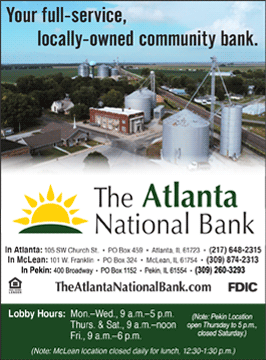Federal Reserve likely to air divisions as it keeps rates unchanged
[July 30, 2025] By
CHRISTOPHER RUGABER
WASHINGTON (AP) — Two top Federal Reserve officials could dissent from
the central bank’s likely decision Wednesday to hold its key interest
rate steady, a sign of division at the Fed that reflects the economy's
muddy outlook and possibly the jockeying to replace Chair Jerome Powell
when his term ends in May 2026.
Based on their public comments in the past two months, it's possible
that governors Christopher Waller and Michelle Bowman could vote against
leaving the short-term rate at about 4.3%. If so, it would be the first
time two governors have dissented in over three decades.
The division could be a preview of what might happen after Powell steps
down, if President Donald Trump appoints a replacement who pushes for
the much lower interest rates the White House desires. Other Fed
officials could push back if a future chair sought to cut rates by more
than economic conditions would otherwise support.
For now, any dissent also would likely reflect that there are at least
two different ways to see the U.S. economy, which is clearly in flux.
The first is the way that most Fed officials have described it:
Unemployment is at a low 4.1%, while the economy is growing, albeit
modestly, and inflation did tick up in June, largely because of tariffs.

So, the thinking goes, why not stand pat on rates and see what happens
next? If inflation continues to worsen, a rate cut could make things
worse — the Fed typically raises borrowing costs to combat inflation.
And as long as the economy is doing well, there is no need to cut to
support growth.
The other view is more worrisome: There are signs the economy is
weakening, such as sluggish hiring, slower consumer spending, and pretty
modest overall growth. The economy, in the first six months of the year,
probably expanded at an annual rate of about 1.5%. At the same time,
tariffs have lifted inflation by less than many economists expected, so
far.
This is the view of the economy that Waller sketched out in a speech
earlier this month.
“Private-sector payroll growth is near stall speed,” Waller said. “We
should not wait until the labor market deteriorates before we cut the
policy rate.”
When the Fed cuts its rate, it often — but not always — leads to lower
borrowing costs for mortgages, auto loans and credit cards.
[to top of second column] |
 Some economists agree with Waller's
concerns about the job market. Excluding government hiring, the
economy added just 74,000 jobs in June, with most of those gains
occurring in health care.
“We are in a much slower job hiring backdrop than most people
appreciate,” said Tom Porcelli, chief U.S. economist at PGIM Fixed
Income.
Waller was appointed to the Fed's seven-member governing board by
Trump during the president's first term. He has often been mentioned
as a potential replacement for Powell. Waller has underscored in
several speeches that he does not think Trump's tariffs will lead to
persistently higher inflation.
Bowman, the vice chair for regulation, was also appointed during
Trump's first term. She suggested in June that the Fed should soon
reduce borrowing costs. Bowman is also a possible Powell
replacement, though more of a long shot.
Michael Feroli, an economist at JPMorgan Chase, said in a note to
clients this week if the pair were to dissent, “it would say more
about auditioning for the Fed chair appointment than about economic
conditions.”
The Fed's two-day meeting comes after a week of extraordinary
interactions with the Trump White House, which has accused Powell of
mismanaging an extensive, $2.5 billion renovation of two office
buildings. Trump suggested two weeks ago that the rising cost for
the project could be a “firing offense” but has since backed off
that characterization.
Notably, Trump argues that the Fed should cut because the economy is
doing very well, which is a different viewpoint than nearly all
economists, who say that a healthy, growing economy doesn't need
rate cuts.
“If your economy is hot, you're supposed to have higher short-term
rates,” Porcelli said.
All contents © copyright 2025 Associated Press. All rights reserved
 |